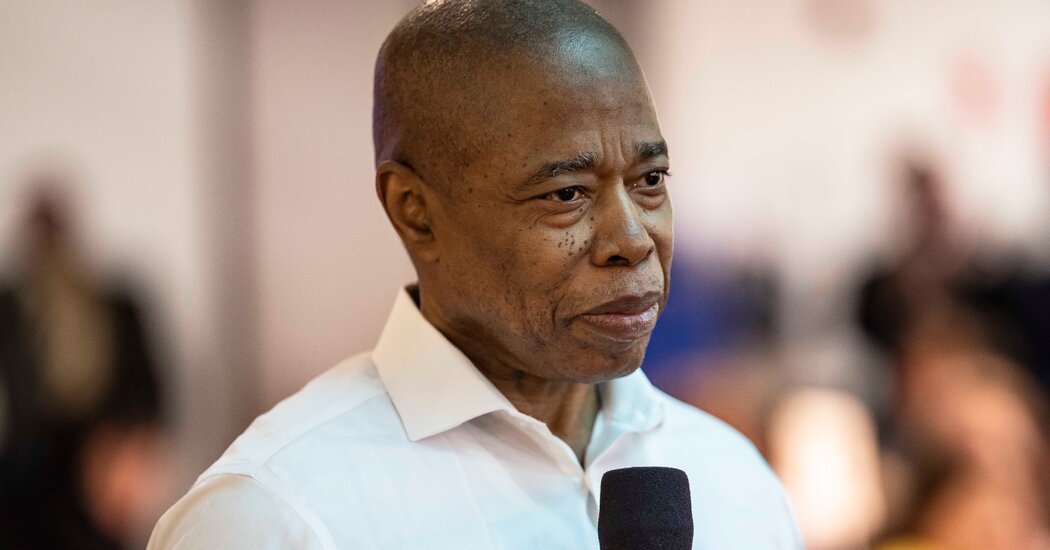On the 39th floor of a Midtown Manhattan high-rise, Gov. Kathy Hochul on Tuesday presided over a series of meetings to discuss one of the most consequential decisions of her tenure: whether to remove Mayor Eric Adams from office.
She solicited opinions from Brad Lander, the city comptroller, and Adrienne Adams, the City Council speaker. She shared coffee and tea with the Rev. Al Sharpton and talked to others over the phone or video chat.
She gave no indication that she would come to a quick decision on the mayor, who, by chance, was only a dozen blocks away, declining to answer questions about his future. He brushed aside reporters as he brusquely explained his refusal.
“’Cause you’re all liars,” he said.
Mr. Adams has once again found himself in a state of crisis.
The Justice Department’s move to drop his five-count federal indictment probably eliminated the prospect of a trial while he seeks re-election, but it may have deepened the mayor’s political damage.
The prosecutor overseeing the mayor’s case accused Mr. Adams late last week of agreeing to a quid pro quo with Trump administration officials. In exchange for leniency in the criminal case, she said, the mayor would help the president with immigration enforcement.
The suggestion that Mr. Adams would do Mr. Trump’s bidding, which the mayor has denied, brought widespread condemnation. Calls for his resignation or for the governor to remove him have escalated. Talk of empaneling a committee of mayoral inability has surfaced.
And on Monday, Mr. Adams’s first deputy mayor, Maria Torres-Stringer, and three other well-respected deputy mayors announced their resignations. The deputies did not directly cite the mayor’s cooperation with the Trump administration but alluded to “the extraordinary events of the last few weeks.”
The officials were government veterans who served as the backbone of the administration, leading a vast bureaucracy of roughly 300,000 city workers and key initiatives to build urgently needed housing and to improve public safety. Ms. Hochul said that the four officials’ resignations raised “serious questions about the long-term future of this mayoral administration.”
“This is an unmitigated disaster,” said Mark Levine, the Manhattan borough president, on X. “Each one of these leaders is a seasoned, talented professional. Their loss will leave New York City government in a truly precarious position.”
Their departures raised alarm over who was running the city and whether Mr. Adams could attract qualified candidates given the chaos surrounding him and his re-election campaign.
Lincoln Restler, a City Council member from Brooklyn, said that he was confident that city workers would make sure the trash was picked up and schools operated, but that it would be impossible to make “any decision of consequence in city government.”
“For many city workers, there was solace in knowing that longtime government experts like Maria were there to steady this ship and to avoid the worst dysfunction and excess and corruption of Eric Adams and his cronies,” he said. “Without that safety net, it’s scary.”
Mr. Adams did little to allay those concerns on Tuesday, when it emerged that he had already chosen a replacement for one of the departing deputy mayors: Kaz Daughtry, a deputy police commissioner known for his combative social media presence and close relationship with the mayor. Mr. Daughtry was to replace Chauncey Parker as deputy mayor for public safety, according to two people familiar with the matter.
Mr. Adams, a Democrat, has insisted that he will not step down and that he will run for re-election in the June primary. But his path forward is becoming increasingly difficult.
Mr. Sharpton said after his meeting that the governor had not yet decided on a course of action but is waiting for the outcome of Judge Dale E. Ho’s hearing on Wednesday on dropping federal charges against Mr. Adams.
“The governor said to me that she’s going to see what the judge decides tomorrow and keep deliberating with other leaders,” Mr. Sharpton said.
“My feeling is that the faith of the city has been shaken, and there needs to be a resolve, but at the same time, we must protect the law and not establish a precedent that could come back to haunt us,” he added.
Mr. Lander, the city comptroller who is also running for mayor, said at a news conference on Tuesday that he wanted Mr. Adams to resign and allow the interim mayor to leave in place the four deputy mayors who have said they are resigning.
He has threatened to convene a committee to remove Mr. Adams on the basis of his inability to govern unless the mayor quickly released a “detailed contingency plan” outlining how he would manage the city. The City Charter provides for such a committee in the case of a mayor who may be unable to serve.
Mr. Lander and Ms. Adams, along with the Queens borough president, Donovan Richards, who also met the governor on Tuesday, would be among the five members of the committee of mayoral inability; the other two would be a deputy mayor chosen by the mayor and his corporation counsel. Four of the five would have to vote to remove the mayor.
Mr. Lander said he discussed with Ms. Hochul both options for removal: by the governor and the inability committee.
“We acknowledge both of them are relatively untested,” Mr. Lander said.
Ms. Adams played down the idea of invoking the inability committee, telling reporters at City Hall on Tuesday that it was meant to address serious health concerns, which “does not apply to this situation.”
Mr. Adams, the city’s second Black mayor, is facing defections from the Black political establishment. On Saturday, Andrea Stewart-Cousins, the State Senate majority leader, joined a chorus of Black leaders calling for the mayor’s resignation.
Earlier on Saturday, Carl McCall, a Black elder statesman and a former state comptroller, went public with an open letter urging former Gov. Andrew M. Cuomo to run for mayor. The endorsement was notable because of the men’s former rivalry: Their competition for the 2002 Democratic nomination for governor, which Mr. McCall won, nearly ended Mr. Cuomo’s political career.
Although Mr. Cuomo has not yet entered the race, polls place him far ahead of his Democratic rivals, most of whom are to the left of the former governor and Mr. Adams. One of those candidates, Zohran Mamdani, announced on Tuesday that he would receive $2.8 million in matching funds from the Campaign Finance Board, more than any other mayoral candidate during the recent fund-raising period.
There is no parallel in modern New York City history to the federal investigations into the mayor and his inner circle and the new wave of resignations. The last broad municipal scandal was in 1986 under Mayor Edward I. Koch, when the leaders of three city agencies were indicted. In 1979, Mr. Koch demoted two of his seven deputy mayors and fired three others in a major shake-up.
Only two mayors have resigned, both after corruption scandals: Jimmy Walker in 1932 and William O’Dwyer in 1950.
Mr. Adams received more bad news on Tuesday, when the Campaign Legal Center, a nonprofit group based in Washington, D.C., that does advocacy work on election-related issues, said it had filed a complaint against him with the Federal Election Commission.
The group’s complaint cites the indictment of Mr. Adams that federal prosecutors in Manhattan filed in September, charging that Mr. Adams and his campaign committees schemed to solicit and accept illegal campaign contributions from foreign nationals. It provides examples of the accusations described in the indictment.
The complaint calls on the F.E.C. to take action because “the Justice Department has abdicated its duty to pursue justice and accountability, and to safeguard the integrity of our elections.”
At his appearance at Bellevue on Tuesday to visit a police officer who had been shot earlier in the day, Mr. Adams was accompanied by the police commissioner, Jessica Tisch. Neither answered questions related to the resignations or the mayor’s future, but a spokeswoman for the Police Department said Ms. Tisch had no intention of leaving.
“She’s committed to the rule of law,” said Delaney Kempner, deputy commissioner of public information. “She’s not going anywhere.”
Reporting was contributed by Maia Coleman and Michael Rothfeld.





